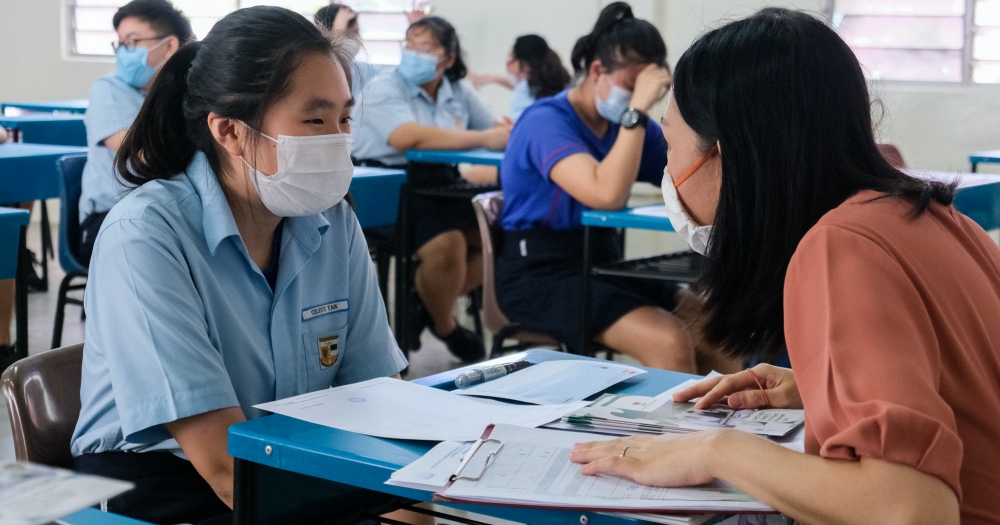The Ministry of Education (MOE) will strengthen support for students' mental well being across the education system this year.
Dedicated key personnel to oversee students' well-being
During the Committee of Supply (COS) debate on March 3, Minister of State for MOE Sun Xueling said that starting in 2021, schools will appoint a dedicated key personnel to oversee peer support and student well-being matters.
This key personnel will consist of experienced teachers in the school's student development teams.
They will oversee and implement prevention and intervention measures to create a peer support culture in students' learning, social, and cyber spaces.
They will also tap on peer supporters to positively influence and support students involved in bullying and cyber issues.
According to MOE, all schools are expected to have appointed these key personnel by the end of 2021.
Peer support
MOE is also on track to have a peer support structure and culture in every primary, secondary, and pre-university schools by end-2021.
This will allow students look out for one another and encourage those in distress to seek help from trusted adults, such as their parents, teachers or school counsellors.
Schools will also train up to five per cent of students as peer support leaders (PSLs) to anchor a supportive network in the school.
As PSLs, they will promote positive mindsets, prosocial behaviours both online and offline, and be a good role model to other students.
Revising CCE curriculum
The Character and Citizenship Education (CCE) curriculum will be revised to make it more authentic, relevant and purposeful for students.
The revised curriculum will have a strengthened mental health and cyber wellness education, explained Sun.
"We recognise the nexus between increasing digital usage and mental health concerns, even more so amongst our young who may not know how to regulate the use of social media," explained Sun.
Sun added that teachers will work alongside student peer supporters to look out for other students. MOE will also work with parents to help guide their children in the use of online media.
During CCE lessons, students will learn to identify risks in the digital space, such as doxing or scams, discern unverified or inappropriate content, and take steps to protect themselves and others.
Schools will also guide students to report cyber-bullying and harmful content to the online service provider.
In secondary schools and pre-university, students will also have regular discussions on contemporary issues, such as environmental sustainability, and race and religion.
According to MOE, the revised curriculum will be progressively implemented in all schools from this year, starting with the secondary level.
Sun said:
"Through CCE 2021, we hope that students will be equipped to become more resilient, and to be healthy, and engage one another respectfully and constructively on issues."
New mental wellness curriculum in poly and ITE
The Institutes of Higher Learning (IHLs) are similarly strengthening their ongoing efforts to support students' mental health, said Sun.
MOE is introducing a new mental wellness curriculum for all Year 1 students in polytechnics and the Institute of Technical Education (ITE) from AY2020 and AY2021 respectively.
The curriculum was designed in collaboration with the Health Promotion Board (HPB) to raise awareness and understanding of mental health, through topics such as identifying risk factors and stress.
It also aims to teach students to understand signs of anxiety and depression, and encourage early help-seeking behaviour.
Besides the new curriculum, the polytechnics and ITE, in collaboration with HPB, will roll out a common training programme for peer supporters from 2021 to 2023.
Peer supporters will be trained on a range of key skillsets, such as active listening, how to recognise signs of distress, and having a deeper appreciation of the importance of self-care.
This will better equip them to look out for one another's well-being and alert a trusted adult if their peers are feeling distressed or facing mental health issues.
Peer support structures will also be enhanced, including through regular supervision of and greater recognition for peer supporters.
Additionally, the IHLs will continue to build community partnerships, partnering community organisations to further amplify mental well-being messages, including raising awareness of support available to students and youths in the community.
More CCE training for teachers
Previously during the COS debate, education minister Lawrence Wong had said that teachers will be receiving more help this year to be better equipped to support the students' mental well-being.
Wong announced that MOE will be strengthening PD for teachers in CCE and establishing a centre for CCE in the National Institute of Education (NIE) by end-2022.
The centre will provide thought leadership for CCE and conduct CCE-related research to inform policy and practice, with greater emphasis on practice and pedagogy in the local context.
It will also collaborate with schools to enhance learning of CCE, and provide pre-service and in-service professional development (PD) courses, with various forms of certifications.
MOE and the NIE have developed a new pre-service CCE course to equip all student-teachers with the fundamental content and skills to teach CCE.
Almost all secondary schools now have four specialised CCE teachers to role model and mentor other teachers in facilitating challenging discussions in CCE lessons.
From 2022 onwards, all pre-universities will also have a group of specialised CCE teachers to facilitate learning in CCE, including topics that may be complex and/or sensitive.
"Our goal is for every teacher to be a CCE teacher and we will provide them full support to achieve this," said Wong.
Top image from MOE/FB for illustration purposes only.
If you like what you read, follow us on Facebook, Instagram, Twitter and Telegram to get the latest updates.
